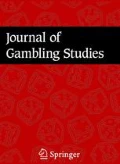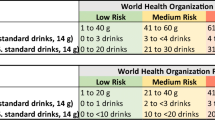Abstract
Background
Although there are few interventions available to provide screening and brief intervention targeted toward problematic gambling, Screening, Brief Intervention and Referral to Treatment (SBIRT) is an evidence-based intervention that has demonstrated effectiveness in reducing gambling behaviors.
Methods
The goal of this pilot study was to evaluate the feasibility, acceptability and preliminary outcomes of a gambling specific SBIRT intervention in a medical setting. Fifteen participants were recruited from an urban HIV/Primary Care clinic to receive the gambling specific SBIRT intervention delivered by 3 clinicians. Process and gambling specific outcome measures were evaluated at baseline, immediately after the intervention and at 1-month follow-up.
Results
On average, patient participants were 49 years and self-described themselves as male (60%) and Black or African American (86.7%). Three (20%) participants met 4 or more criteria of the DSM-5 gambling disorder. Compared to baseline, those who participated in the intervention decreased both the median number of days gambled (1 days vs. 0 days), as well as the median money gambled at 1-month follow-up ($7 vs. $1). Participants with 4 or more criteria of DSM-5 gambling had the greatest reduction (days gambled: (26 days vs. 21 days); money spent: (($400 vs. $65)). Participants reported that the intervention was acceptable. Clinician participants found the intervention to be easy to deliver.
Conclusions
A gambling specific SBIRT intervention was feasible to deliver and acceptable to participants. Gambling specific outcome measures were reduced at 1-month follow-up. A randomized control trial to evaluate the efficacy of the intervention is a recommended next step.






Similar content being viewed by others
Code availability
STATA (version15.1).
References
American Psychiatric Association. (2013). DSM-5 diagnostic classification. Diagnostic and Statistical Manual of Mental Disorders. https://doi.org/10.1176/appi.books.9780890425596.x00diagnosticclassification
Babor, T. F., McRee, B. G., Kassebaum, P. A., Grimaldi, P. L., Ahmed, K., & Bray, J. (2007). Screening, brief intervention, and referral to treatment (SBIRT): Toward a public health approach to the management of substance abuse. Substance Abuse, 28(3), 7–30
Bernstein, J., Bernstein, E., Tassiopoulos, K., Heeren, T., Levenson, S., & Hingson, R. (2005). Brief motivational intervention at a clinic visit reduces cocaine and heroin use. Drug and Alcohol Dependence, 77(1), 49–59
Bien, T., Miller, W. R., & Tonigan, J. S. (1993). Brief interventions for alcohol problems: A review. Addiction, 88(3), 315–335. https://doi.org/10.1111/j.1360-0443.1993.tb00820.x
Cunningham, J. A., Hodgins, D. C., Toneatto, T., Rai, A., & Cordingley, J. (2009). Pilot study of a personalized feedback intervention for problem gamblers. Behavior Therapy, 40(3), 219–224. https://doi.org/10.1016/j.beth.2008.06.005
Evans, L., & Delfabbro, P. H. (2005). Motivators for change and barriers to help-seeking in Australian problem gamblers. Journal of Gambling Studies, 21(2), 133–155
Goodyear-Smith, F., Arroll, B., Kerse, N., Sullivan, S., Coupe, N., Tse, S., Shepherd, R., Rossen, F., & Perese, L. (2006). Primary care patients reporting concerns about their gambling frequently have other co-occurring lifestyle and mental health issues. BMC Family Practice. https://doi.org/10.1186/1471-2296-7-25
Hodgins, D. C., Currie, S. R., Currie, G., & Fick, G. H. (2009). Randomized trial of brief motivational treatments for pathological gamblers: More is not necessarily better. Journal of Consulting and Clinical Psychology, 77(5), 950–960
Humeniuk, R., Ali, R., Babor, T., Souza-Formigoni, M. L. O., de Lacerda, R. B., Ling, W., McRee, B., Newcombe, D., Pal, H., Poznyak, V., Simon, S., & Vendetti, J. (2012). A randomized controlled trial of a brief intervention for illicit drugs linked to the alcohol, smoking and substance involvement screening test (ASSIST) in clients recruited from primary health-care settings in four countries. Addiction, 107(5), 957–966
Langan, K., Wall, M., Potts, W., & Himelhoch, S. (2019). Prevalence and potential predictors of gambling disorder among people living with HIV. AIDS Care - Psychological and Socio-Medical Aspects of AIDS/HIV. https://doi.org/10.1080/09540121.2018.1499858
Martin, G., & Copeland, J. (2010). Brief intervention for regular ecstasy (MDMA) users: Pilot randomized trial of a Check-up model. Journal of Substance Use, 15(2), 131–142
McLellan, A. T., Luborsky, L., Woody, G. E., & O’Brien, C. P. (1980). An improved diagnostic evaluation instrument for substance abuse patients. The Addiction Severity Index. Journal of Nervous and Mental Disorders, 168(1), 26–33
McMillen, J., Marshall, D., Murphy, L. F., Lorenzen, S., & Waugh, B. (2004). Help-Seeking by Problem Gamblers, Friends and Families: A Focus on Gender and Cultural Groups.
Morasco, B. J., Pietrzak, R. H., Blanco, C., Grant, B. F., Hasin, D., & Petry, N. M. (2006). Health problems and medical utilization associated with gambling disorders: Results from the national epidemiologic survey on alcohol and related conditions. Psychosomatic Medicine, 68(6), 976–984
Pasternak, A. V., IV. (1999). Prevalence of gambling disorders in a primary care setting. Archives of Family Medicine. https://doi.org/10.1001/archfami.8.6.520
Petry, N. M., Weinstock, J., Ledgerwood, D. M., & Morasco, B. (2008). A randomized trial of brief interventions for problem and pathological gamblers. Journal of Consulting and Clinical Psychology, 76(2), 318–328
Pulford, J., Bellringer, M., Abbott, M., Clarke, D., Hodgins, D., & Williams, J. (2009). Barriers to help-seeking for a gambling problem: the experiences of gamblers who have sought specialist assistance and the perceptions of those who have not. Journal of gambling studies, 25(1), 33–48
Rounsaville, B. J., Carroll, K. M., & Onken, L. S. (2001). A stage model of behavioral therapies research: Getting started and moving on from stage I. Clinical Psychology: Science and Practice, 8, 133–142
Tavares, H., Martins, S. S., Zilberman, M. L., & El-Guebaly, N. (2002). Gamblers seeking treatment: Why haven’t they come earlier? Addictive Disorders and Their Treatment, 1(2), 65–69
Tolchard, B., Thomas, L., & Battersby, M. (2007). GPs and problem gambling: Can they help with identification and early intervention? Journal of Gambling Studies, 23(4), 499–506
Wilk, A. I., Jensen, N. M., & Havighurst, T. C. (1997). Meta-analysis of randomized control trials addressing brief interventions in heavy alcohol drinkers. Journal of General Internal Medicine, 12(5), 274–283
Acknowledgements
This project was supported through funding by the National Center for Responsible Gaming (NCRG)
Funding
This project was supported through funding by the National Center for Responsible Gaming (NCRG).
Author information
Authors and Affiliations
Corresponding author
Ethics declarations
Conflict of interest
The authors declare they have no conflict of interest.
Additional information
Publisher's Note
Springer Nature remains neutral with regard to jurisdictional claims in published maps and institutional affiliations.
Rights and permissions
About this article
Cite this article
Heinlein, E., Rugle, L., Potts, W. et al. A Within-Subject Pilot Feasibility Study of a Gambling Specific SBIRT Intervention Delivered in an Urban HIV/Primary Clinic. J Gambl Stud 38, 545–558 (2022). https://doi.org/10.1007/s10899-021-10031-4
Accepted:
Published:
Issue Date:
DOI: https://doi.org/10.1007/s10899-021-10031-4




